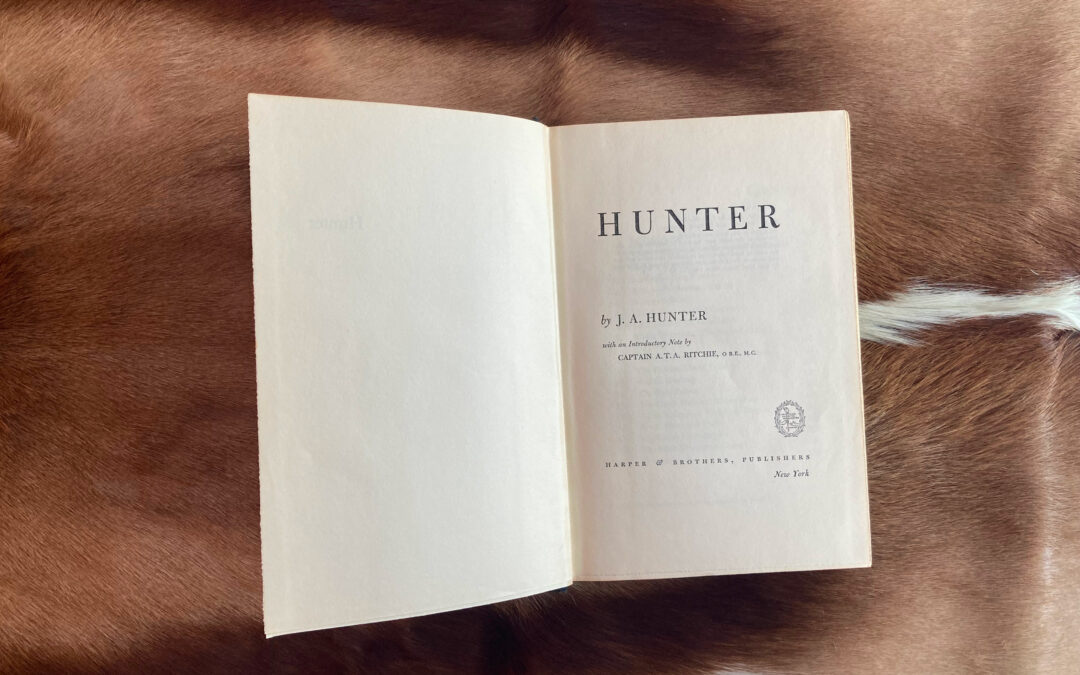Hunter
J.A. Hunter (Harper & Brothers, Publishers, 1952, 264 pages.)
Reviewed by Ken Bailey
At times we have a tendency to ignore or belittle the common in favor of whatever shiny new penny comes along; judging by all the love given the new 6.5, .27 and .28 rounds on the market, this is certainly true when it comes to hunting cartridges. Having just reread Hunter, I suspect it’s also true for African hunting literature.
For many, in North America at least, with the possible exception of Capstick’s Death in the Long Grass, Hunter was the first African hunting book many of us read. It helped fuel our growing desire to one day visit “the Dark Continent” and forge our own adventures with charging buffalos, rogue elephants and marauding lions. At some point we put this book down and, as our experiences in, and knowledge about, Africa grew, moved on to other literature. That’s excusable, I suppose, as there’s enough compelling reading about African hunting to keep even the most ardent armchair nimrod enthralled for a lifetime. But if you’re like me, and haven’t read Hunter for a long while, do yourself a favor and give it a reread.
- A. (John) Hunter heard the hunter’s horn growing up on a farm in Scotland in the last decade of the 19th century. A bit of a troublemaker, as a teenager an infatuation with an older woman led to him being sent to live with shirtsleeve relatives in Kenya. That was the kicking off point for his life in East Africa that saw him evolve from working as a guard on the railroad to becoming a PH to working in game control for the Kenya Game Department. In Hunter he chronicles this evolution with a detail that is as descriptive and educational as it is compelling. And it is, most certainly, compelling.
By his own account, Hunter describes his book as, “A record of the last great days of big game hunting.” He goes on to say, “I hold a world record for rhino, possible for lion… and I have shot more than fourteen hundred elephant. I certainly do not tell of these records with pride. The work had to be done and I happened to be the man who did it.”
As you might expect given his track record, he had many close calls and life-threatening encounters with the Big Five and he describes many of them here with a matter-of-fact precision that allows you to close your eyes and picture the scene as if you were there. This attention to detail, in fact, is one of the attributes that keeps the reader from putting this book down.
Each chapter describes a different aspect or experience in his career as a PH and game ranger, from his first safari in the Serengeti and Ngorongoro Crater to culling lions in Masailand to hunting the fabled Ituri Forest in the Belgian Congo. In the chapter, “The Great Makueni Rhino Hunt,” Hunter leads by describing it as, “the greatest big game hunt that was ever undertaken by me – or for that matter anyone else.” Hired to thin out rhinos for the benefit of the local Wakamba tribe, he eventually culls 163 and, as you might expect, experienced many harrowing days in the process. As one humorous aside, he talks about testing the powers of rhino horn as an aphrodisiac, using a time-tested recipe provided by an Indian trader. Hunter’s assessment? “I felt no effects.”
If you’re even a modest collector of books about hunting in Africa, you undoubtedly have Hunter on your shelf. Equally likely is that you haven’t read it in quite some time. Believe me when I suggest you dust it off and read it again; you can thank me later.

